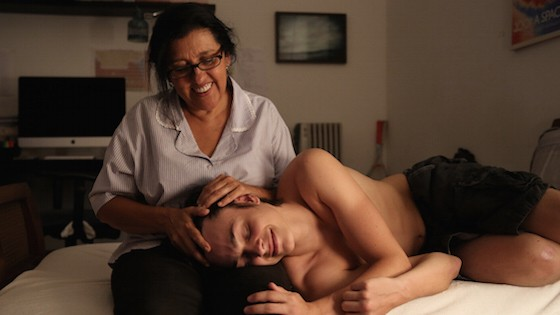Second Mother/Que Horas Ela Voltar?
The Portuguese title of the The Second Mother–Que Horas Ela Voltar?–means: what time will she return, or when will she come back? Both the original and the English names illuminate different aspects of this Brazilian film, starring Regina Casé, one of the country’s most vibrant and interesting actresses. The Portuguese title remains vague about exactly who the “she” is and focuses on the question of reunion; the English zooms in on the issue of mothering.
Casé plays Val, a maid for an upper-class family who also serves as a strong maternal figure for Fabinho, the couple’s nearly college-age son. She is Fabinho’s nanny, the one he allows to hug and kiss him, stroke his hair and comfort him, and hear the “I love yous” he withholds from his parents. Val is the family’s heart–even Maggie the dog sticks close by her. At the same time, she’s estranged from her own daughter, Jessica, who she hasn’t seen for years. But all that’s about to change. Jessica is moving to Sao Paulo hoping to enter a prestigious university and study architecture. And she has a radically different concept of social relations and class than Val.
Even more than the question of maternal love and care, The Second Mother explores the tense dynamic between wealthy employers and the help they hire to manage their lives. Brazilians would immediately recognize Val’s background from her accent. She is one of the many northerners who migrated south to Sao Paulo in search of jobs; most remain poor, relegated to favelas on the outskirts of town. Val lives in the mansion where she works, but in a tiny, airless room where she keeps her window shut because it “wouldn’t make anything cooler, but would let in the mosquitoes.” Though her employers are kind off the surface and glibly say she’s like “family,” they deliver little pinpricks of cruelty, thoughtless insults that Val overlooks. She herself would consider it a breach of etiquette to swim in their pool or eat the special ice cream they save for Fabinho; the luxuries of the villa are off-limits to her and her brand of ice cream comes cheap. Many shots in the early scenes emphasize the spatial distance between her and her bosses, Dr. Carlos and the stylish, ambitious Bárbara. We see Val in the kitchen, in relative close-up, eavesdropping, while we glimpse the family away in the other room, framed by doorways. The gulf between them is more than just physical; it is about worth in the world, how people are valued by society.
Jessica cannot tolerate the obsequiousness that Val has so carefully cultivated in order to survive. She immediately claims “upstairs” space, gobbles the expensive ice cream, and forges a relationship with Dr. Carlos that breaks the boundaries that should separate servant and master. Who should we relate to here–Val, who asserts that “there’s a natural order of things,” and who “knows her place” (which she must, in order to keep her job)? Or Jessica, who refuses to accept a subservient role? Val claims Jessica thinks she’s better than everyone else; Jessica retorts that she doesn’t feel superior to others, but neither is she their inferior. What is certain is that Jessica’s outspokenness triggers an almost chemical reaction that gradually exposes the reality of Val’s situation–and that of Don Carlos, Bárbara, and Fabinho, too.
At one point early in the film, Bárbara tells a journalist that “style is being who you are.” Her glib comment in the interview takes on deeper meaning as the film proceeds and Val comes to discover, indeed, who she really is . . . and to embody that reality with joyful, vivacious power.
Written by MFF Blogger Karen Backstein

